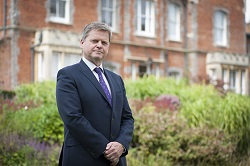End of year message from the Vice-Chancellor
Tuesday, 17 December 2019

Dear Colleagues,
After a busy start to the academic year, I'm sure I'm not the only one looking forward to a few days of rest and spending some more time with family and friends. Let me take this opportunity to wish you a very merry Christmas and a well-deserved break. Above all, I want to thank everyone for your ongoing commitment and hard work.
There is no doubt that 2019 has been an eventful year. There have been some highlights, and the cricket world cup final won by England after the first-ever super over was definitely one of those for me (and, yes, a good cricket match can keep me glued to the TV more than anything else). The year has also brought some serious challenges, both internally and externally. The UK's future relationship with the EU has been one of the most important and, even now the outcome of the General Election is known, will continue to dominate debate for the months and years to come as this relationship needs to be redefined.
Another major theme of 2019 has been the massively elevated profile of the debate about climate change. A 16-year-old climate activist has been named Time Magazine's Person of the Year and environmental issues rivalled Brexit at the top of the UK political agenda - both seemingly unthinkable even five years ago.
The General Election itself, the result and its immediate aftermath also demonstrate that there are many who are disheartened by the state of our national politics and who feel marginalised and unrepresented.
More than ever, there is a need for institutions like the University of Reading, with a social purpose that extends beyond the political cycle, to focus on our core purpose and to engage positively with the world around us. We must continue to be a voice for respect and inclusion, starting with our own University community and extending to the region, nation and world around us. Through our education and research, and the hard work that goes into supporting and delivering both, we have the immense privilege of informing public debate and helping shape the future for the better. Our role in pushing for fact-based policy-making and leading by example through our collective action puts us at the forefront of this change.
Looking forward to 2020, and further ahead to our centenary in 2026, I recently presented a draft of our new strategy to the University Council. This builds on what the four principles of Community, Excellence, Sustainability and Engaged University mean in practice, based on all the feedback and discussions to date. I feel more than ever that these encapsulate the right values to lead us into our centenary, and members of Council agreed.
We will now progress our delivery and evaluation plans. Like the strategy development so far, this must be a collective effort. As part of the five-year planning process, all Heads of School and Function have been asked to demonstrate how they will embed the strategic principles into operations, and environmental sustainability and staff wellbeing have been added to our existing institutional planning priorities of student recruitment, NSS and research income. These local plans will have an important role in shaping our University-wide priorities and activities.
Between now and March, when Council will sign off on the final strategy, UEB will work with a range of representative groups including the Staff Forum, the People Plan Board, Senate, UCU and RUSU to refine our priority activities. We are also establishing oversight groups to shape and coordinate our environmental sustainability and engagement work, both of which will have places for volunteers from our University community. In addition, my next briefing sessions in February will provide further opportunity for debate and discussion.
And as always, I encourage you to share your thoughts and ideas directly by emailing university.strategy@reading.ac.uk.
But that's all for 2020! In the meantime, my very best wishes for the festive season.
Robert
Professor Robert Van de Noort
Vice-Chancellor, University of Reading
